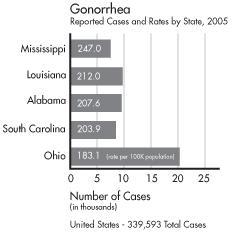Because gonorrhea is the University’s second-most common sexually transmitted infection behind chlamydia, some students believe the University has its own type of gonorrhea.
Louisiana had the second highest infection rate of gonorrhea in the country in 2005, according to the Centers for Disease Control and Prevention.
But the Student Health Center disputes that myth.
“If there was a disease that only affected the LSU community, the Student Health Center would take the steps needed in prevention, education and treatment along with following the guidelines from the CDC,” Wellness Education Coordinator Ashley Granger said. “I do not know where, how or why this rumor was started.”
Gonorrhea is a sexually transmitted infection that is spread most commonly through anal, vaginal or oral sex, Granger said.
According to the American College Health Association, one in four college students will contract a sexually transmitted infection before graduating.
University students, like biological sciences sophomore Malarie Jenkins, do not believe Granger.
“I do [believe the rumors], because LSU is too big for there not to be a growing case of gonorrhea,” Jenkins said.
Megan Voiselle, English sophomore, said she agrees young people are not always educated about sex.
“I could possibly believe [the rumors] because I think as young people we either don’t take the time to educate ourselves about those types of issues, or feel like it could never happen to us, and [we] don’t care to know,” Voiselle said.
Julie Mickelberry, direct of public affairs for Planned Parenthood, said Louisiana has abstinence until marriage sex education, which could contribute to the high rate of gonorrhea and other sexually transmitted diseases and infections.
“Louisiana takes an abstinence only until marriage approach to sex education, which denies young people medically accurate information needed to make lifelong and responsible decisions about their sexual health,” Mickelberry said. “As a result, young people don’t have the knowledge or tools to stay healthy when they decide to become sexually active.”
Dr. Stephanie Taylor, associate professor at LSU Health Sciences Center and Section of Infectious Diseases Medical Director at Delgado Community College, said it is important to get checked for gonorrhea and chlamydia because it increases the risk of contracting HIV.
“When a person has an infection in the genital area, the cell type that likes to attach to HIV is greatly increased in this area,” she said. “Gonorrhea is curable, so it is important to get tested.”
Mickelberry said anyone who has had unprotected sex should be tested.
“It’s recommended that sexually active women and men 26 years of age and under be tested annually for gonorrhea and chlamydia,” she said.
——-Contact Tara Summers at [email protected]
Student Health Center disputes gonnorhea myth
June 13, 2007







